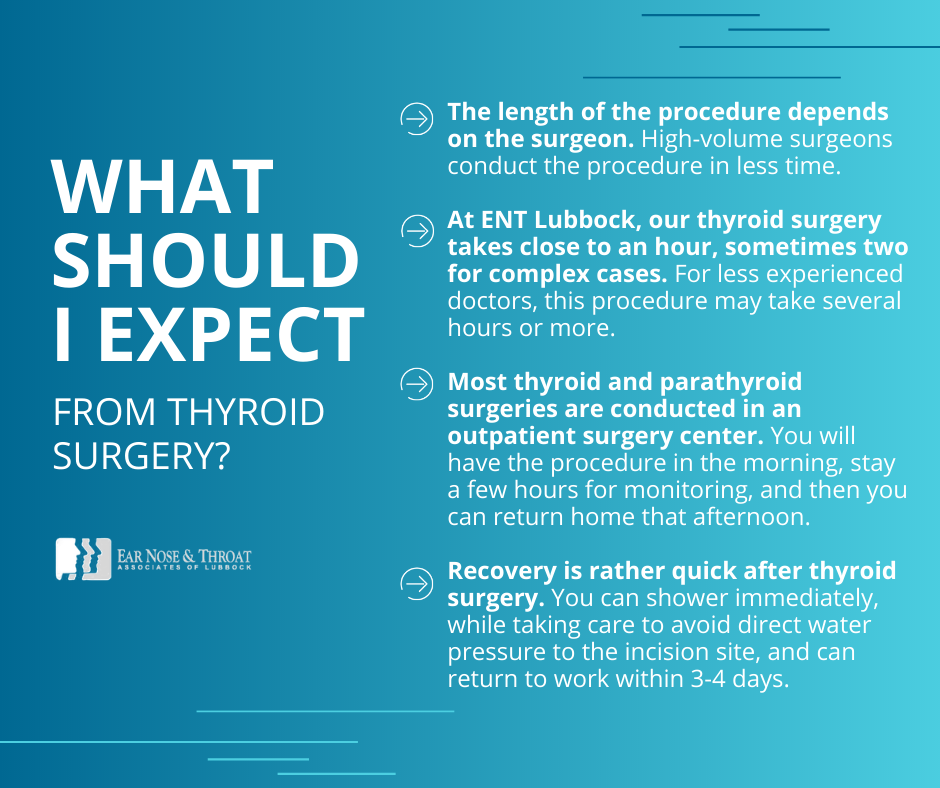Minimally Invasive Thyroid & Parathyroid Surgery FAQ

No one should go into surgery with unanswered questions.
Before any surgery, you deserve a clear understanding of what’s happening. Whether you’re approaching a minimally invasive procedure or a major surgery, never hesitate to talk with your doctor about the specifics of your procedure and ask questions at will.
When considering a thyroidectomy, many patients wonder what to expect after surgery and how long it takes to recover. To get you started, we’ve answered our patients’ top questions about minimally invasive parathyroid surgery and thyroid surgery.
Why Are Thyroid and Parathyroid Surgeries Performed?
Thyroid surgery is performed in order to remove diseased glands. Parathyroid and thyroids are two different glands at the base of the neck. We take out these glands when we see one of two problems:
- Cancer Suspicion: The vast majority of these procedures are done because of nodules suspicious of thyroid cancer.
- Enlarged glands: Large glands producing too much thyroid hormone can cause compressive symptoms or difficultly swallowing. If these glands can’t be suppressed long-term with medications, we opt for removal. Enlarged glands may also indicate malignancy, making removal the safest option.
How “Minimally Invasive” Is Thyroid or Parathyroid Surgery?
Surgeons are increasingly able to make smaller incisions for thyroid surgery. While these incisions were once quite large, now we’re able to create only small incisions located higher on the neck resulting in a better cosmetic appearance. We close incisions with a plastic surgery closure and sutures below the skin. These small incisions create a much improved cosmetic appearance.
Parathyroid surgery is even more minimally invasive. When removing a localized parathyroid tumor, we can opt for an even smaller incision.
Is Thyroid or Parathyroid Surgery a Major Surgery?
When your surgery is in the right hands, it’s not a major surgery. Medical literature recommends choosing a high-volume thyroid surgeon — meaning they conduct at least 50 surgeries per year. In our practice, Dr. Scolaro and Dr. Cuthbertson combined conduct 200-300 surgeries per year. Having this level of experience results in significantly fewer complications, particularly with vocal cord paralysis and permanent calcium problems.
What Are the Risks of Thyroid or Parathyroid Surgery?
The main risk in thyroid surgery is working close to the recurrent laryngeal nerve that moves the vocal cords. The most important part of the surgery is for the surgeon to accurately locate the nerve and the parathyroid glands and then avoid injuring them.
If the nerve is injured, the patient may experience vocal cord paralysis and hoarseness. If the parathyroid glands are injured or removed, the patient may have issues with low calcium. An experienced, high-volume physician should have no more than a 1% rate of vocal cord paralysis.
Parathyroid surgery also poses the risk of lowered calcium levels. There are four parathyroid glands, two on each side near the nerve, each about the size of a grain of rice. Their exact location can be a little variable. Transient low calcium is expected after removal of a parathyroid adenoma. Calcium supplements will be provided temporarily after surgery to mitigate this issue.
When we remove the thyroid gland, it’s normal for the parathyroid glands to temporarily lose their blood supply and go into shock. During this time, they don’t produce as much parathyroid hormone.
This commonly results in a temporary calcium decrease for the patient and is easily remedied with calcium supplements until the parathyroid glands recover. A permanent problem resulting from parathyroid gland damage is extremely rare in the hands of a high-volume surgeon.

How Should I Prepare for Thyroid or Parathyroid Surgery?
Before we initiate surgery, we need to look at health history — particularly relating to the heart or lungs. Surgeons must be informed of previous cardiac procedures, including stints or pacemakers, or a history of blood clots. Patients who take blood thinners will need clearance from their prescribing doctor to stop medications before surgery. Patients should also avoid other substances (like fish oil or aspirin) that may cause excess bleeding during surgery.
All patients should complete a COVID-19 test and necessary paperwork with the surgery center prior to the date of the procedure.
What Should I Expect During Surgery?
The length of the procedure depends on the surgeon. High-volume surgeons conduct the procedure in less time. Our thyroid surgeries may take 1-2 hours, sometimes a little longer for more complex cases. For less experienced doctors, this procedure may take several hours or more.
Parathyroid removal procedure times vary depending on what we need to accomplish. In minimally-invasive surgery for a localized parathyroid adenoma, the gland can sometimes be found in as little as 15-20 minutes. However, the surgery may be as prolonged if all of the glands need to be examined or if the parathyroid hormone levels are drawn during the operation. In very complex cases, it may last as long as several hours.
What Should I Expect After the Surgery?
Most thyroid and parathyroid surgeries are conducted in an outpatient surgery center. Patients have the procedure in the morning, stay a few hours for monitoring following the procedure, and then can return home that afternoon. We typically check them the next morning in our office to make sure there are no complications.
How Long Does It Take to Recover From Thyroid or Parathyroid Surgery?
Recovery is rather quick after thyroid surgery. People can shower immediately, while taking care to avoid direct water pressure to the incision site, and can return to work within 3-4 days.
Patients on blood thinners should discuss how to restart their medication with their PCP or Cardiologist. Other blood thinning medications (such as aspirin or Ibuprofen) should be avoided for a week following surgery.
What Am I Allowed to Eat After Thyroid or Parathyroid Surgery?
Thyroid surgery doesn’t typically affect eating. You may have a slight sore throat for a day or so due to being intubated during surgery. Soft foods may feel better if you find you have throat pain, but otherwise, most patients are able to eat a normal diet.
How Will I Feel After a Thyroidectomy?
These types of procedures that involve a small skin incision do not typically cause much pain. We prescribe just a few pain pills — and even that is usually more than the patient needs. You may have a stiff neck from your head position following surgery, but this only lasts a day or so.
What Type of Doctor Does Thyroid and Parathyroid Surgery?
Historically, only General Surgeons operated on the thyroid, however, over the past 20-30 years, Otolaryngologists (ENTs) have begun to conduct most of these procedures. This transition is due to the fact that ENTs are generally more familiar with the delicate anatomy of the neck and throat. Whether you’re considering your General Surgeon or an ENT for your procedure, the primary concern is how many of these surgeries the doctor does annually. Never hesitate to ask!
Dr. Scolaro is a board-certified Otolaryngologist servicing the South Plains area. He has been practicing in Lubbock since 1990 and has earned a reputation as a skilled and experienced surgeon. He currently serves as the Medical Director for Covenant High Plains Surgery Center campuses, is a member of Covenant Health Partners and is an adjunct faculty professor for Texas Tech University Health Sciences Center School of Medicine. Learn more about Dr. Scolaro.
Categories:








